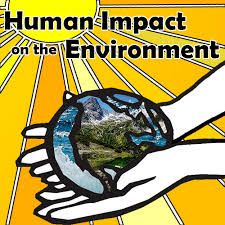The Human Impact
"Social Justice and Human Impact: Bridging the Gap"
The term "human impact" typically refers to the influence and effects of human activities on the environment, society, and various aspects of life on Earth. Human impact can be both positive and negative, and it covers a wide range of topics and areas. Here are some key aspects of human impact:
Environmental Impact: Humans have had a profound impact on the environment. This includes deforestation, pollution of air and water, habitat destruction, and the release of greenhouse gases leading to climate change. These activities have led to loss of biodiversity, altered ecosystems, and various environmental crises.

Climate Change: One of the most significant human impacts on the planet is climate change. Activities such as burning fossil fuels, deforestation, and industrial processes have led to an increase in greenhouse gas concentrations in the atmosphere, resulting in global warming and related consequences like more frequent and severe weather events.
Resource Depletion: Human activities have depleted natural resources, including fossil fuels, minerals, and freshwater. Overfishing, for example, has led to the depletion of fish stocks in many parts of the world. The over-extraction of groundwater has caused problems like subsidence and reduced water availability.
Loss of Biodiversity: Human activities like habitat destruction, pollution, and invasive species introductions have led to a significant loss of biodiversity. Many species are endangered or extinct due to these impacts.
Urbanization: The growth of cities and urban areas has altered landscapes, increased energy consumption, and contributed to habitat destruction. It has also led to social and economic changes, including increased demand for resources.
Social and Cultural Impact: Human activities have profound social and cultural impacts. Globalization, for example, has connected societies worldwide but has also led to cultural homogenization and the loss of traditional practices in some cases.
Health Impact: Human impact extends to public health. Pollution, exposure to harmful chemicals, and changes in lifestyle have implications for human health. Pandemics, such as the COVID-19 pandemic, also have significant human impacts.
Technological Impact: Advances in technology have transformed many aspects of human life. This includes communication, transportation, healthcare, and the workplace. Technology can have both positive and negative impacts, such as increased efficiency but also concerns about privacy and job displacement.
Economic Impact: Economic activities, including trade, industry, and agriculture, have shaped human societies and impacted natural resources. Economic growth can lead to improved living standards but can also result in income inequality and environmental degradation.
Political and Policy Impact: Government policies and decisions can have far-reaching effects on society and the environment. Policies related to energy, environmental protection, healthcare, and education can significantly influence the well-being of populations.
It's important to note that the extent and nature of human impact can vary significantly depending on geographic location, socioeconomic factors, and cultural practices. Recognizing the consequences of human impact is essential for addressing environmental and societal challenges and working towards a more sustainable and equitable future. Efforts are underway globally to mitigate negative human impacts and promote responsible and sustainable practices.
Environmental Impact: Humans have had a profound impact on the environment. This includes deforestation, pollution of air and water, habitat destruction, and the release of greenhouse gases leading to climate change. These activities have led to loss of biodiversity, altered ecosystems, and various environmental crises.

Climate Change: One of the most significant human impacts on the planet is climate change. Activities such as burning fossil fuels, deforestation, and industrial processes have led to an increase in greenhouse gas concentrations in the atmosphere, resulting in global warming and related consequences like more frequent and severe weather events.
Resource Depletion: Human activities have depleted natural resources, including fossil fuels, minerals, and freshwater. Overfishing, for example, has led to the depletion of fish stocks in many parts of the world. The over-extraction of groundwater has caused problems like subsidence and reduced water availability.
Loss of Biodiversity: Human activities like habitat destruction, pollution, and invasive species introductions have led to a significant loss of biodiversity. Many species are endangered or extinct due to these impacts.
Urbanization: The growth of cities and urban areas has altered landscapes, increased energy consumption, and contributed to habitat destruction. It has also led to social and economic changes, including increased demand for resources.
Social and Cultural Impact: Human activities have profound social and cultural impacts. Globalization, for example, has connected societies worldwide but has also led to cultural homogenization and the loss of traditional practices in some cases.
Health Impact: Human impact extends to public health. Pollution, exposure to harmful chemicals, and changes in lifestyle have implications for human health. Pandemics, such as the COVID-19 pandemic, also have significant human impacts.
Technological Impact: Advances in technology have transformed many aspects of human life. This includes communication, transportation, healthcare, and the workplace. Technology can have both positive and negative impacts, such as increased efficiency but also concerns about privacy and job displacement.
Economic Impact: Economic activities, including trade, industry, and agriculture, have shaped human societies and impacted natural resources. Economic growth can lead to improved living standards but can also result in income inequality and environmental degradation.
Political and Policy Impact: Government policies and decisions can have far-reaching effects on society and the environment. Policies related to energy, environmental protection, healthcare, and education can significantly influence the well-being of populations.
It's important to note that the extent and nature of human impact can vary significantly depending on geographic location, socioeconomic factors, and cultural practices. Recognizing the consequences of human impact is essential for addressing environmental and societal challenges and working towards a more sustainable and equitable future. Efforts are underway globally to mitigate negative human impacts and promote responsible and sustainable practices.
#EnvironmentalImpact
#ClimateChange
#Biodiversity
#ZeroWaste
#TechImpact
#EconomicImpact
#PolicyChange
#SocialImpact
#ClimateChange
#Biodiversity
#ZeroWaste
#TechImpact
#EconomicImpact
#PolicyChange
#SocialImpact



Comments
Post a Comment